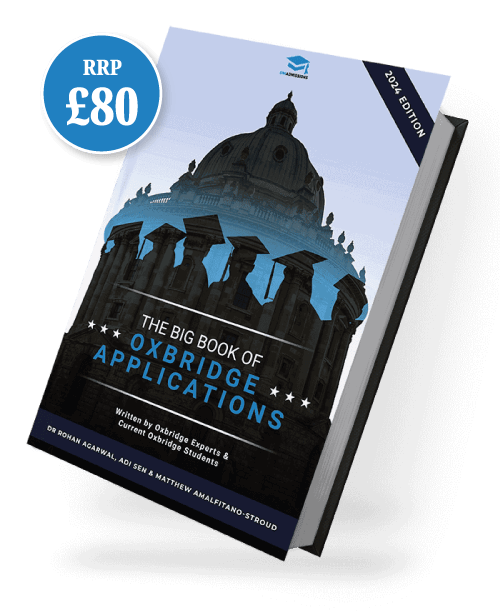Welcome to our popular Personal Statement series where we present a successful Personal Statement, and our Oxbridge Tutors provide their feedback on it.
Today, we are looking through a Law applicant’s Personal Statement that helped secure a place at Oxford University. The Law Course at Oxford offers a world-class opportunity to develop a diverse set of skills which you will be able to apply in many different situations.
Read on to see how this candidate managed to secure an offer from a world-class department.
NEW PERSONAL STATEMENT FORMAT
As of 2025, UCAS Personal Statements will be presented with a new three-question format. Be aware that the Personal Statement featured in this guide was written in the previous free-form format. Despite this, the example will still be beneficial to read as the content included remains the same as what you should aim to write in your own work.
When reading this example, think about which question each paragraph answers. To learn more about the Personal Statement changes, read our dedicated guide to the new Personal Statements here.
Here’s a breakdown of the Personal Statement (the applicant uses most of the 4,000 characters available):
CHARACTERS
3,993
WORDS
662
SUCCESSFUL?
5/5
The universities this candidate applied to were the following:
OXFORD
OFFER
UCL
OFFER
KINGS
OFFER
BRISTOL
OFFER
EXETER
OFFER
Enrolling on our Oxford Law comprehensive Programme will help you perfect your Personal Statement.
When you enrol in our Oxbridge Law Premium Programme, you’re getting the best possible support for all aspects of your application. Your tutor will give you actionable feedback on your Personal Statement drafts, with insider tips on how to improve and make your Personal Statement Oxbridge quality for the best chances of success.
Discover our Premium Programmes today to learn how you can enrol and triple your chances of success.
Law Personal Statement
Law is a set of rules and guidelines imposed upon a society which reflect its moral consciousness, guided and guarded by the judiciary. I believe everyone has the right to be judged objectively by their own laws. I am fascinated by the process of examining legal arguments, by how the outcome of a case hinges on presentation of the evidence and by the law’s status as the ultimate arbiter of ‘justice.’ It is this desire to study the analytical process and underlying principles of jurisprudence that motivates me to study law academically.
Preparing for my extended project, I studied Plato’s Republic and how his analyses of different societies are relevant to modern Britain. Examining the common flaws between our own society and those depicted in Republic made me appreciate the subtlety of the law in its present-day form: many of Plato’s proposed solutions to these flaws undermined what are viewed today as personal rights. This led me to reflect on how laws protect us, and also how their intricacies create a doctrine to which people adhere, both complying and incorporating it in their own morality.
Investigating Plato’s ideal political system, I considered the contrast between how his laws were devised and their status in our own society. Plato’s ‘Guardians’ (not unlike our own judiciary) were relied on both to codify and interpret the law. While their decisions were considered to be benevolent, society was expected to conform to laws dictated by a separate class. The situation in the UK is quite different: statute law, as well as case law, often reflects current popular opinion. Sarah’s law (the parents’ right to check the criminal record of any carer for their child) was the direct result of a popular campaign. Whether it is better to have a system of laws that evolve with society or one that is dictated by a separate body is just one example of the ethical questions behind the law that intrigue me.
Seeking experience in the area of law that first attracted me, I assisted a criminal barrister in a Bristol chambers, including client interviews for petty offences and note taking in Crown Court, where we were prosecuting an alleged serial attempted rapist. The defendant’s decision to dismiss his lawyers to defend himself brought home the need for a professional intermediary to ensure fair interaction of the individual with the protocol of the law. Examining case files while shadowing a Queen’s Counsel specialising in public and taxation law, I was struck by how even the most powerful individual or company is still bound to observe the law. I sought exposure to corporate and commercial law with a local solicitor, where I worked through a practical example of employment law to determine whether a client had a case. This close reading of legal documents was a rewarding and stimulating experience, confirming my commitment to study law.
Captaining rugby teams at school (now 1st XV), club and county level, I have learned how to listen and how to lead; understanding and incorporating others’ opinions or feelings in my interaction was key to encouraging progress for the individual or group, to motivate them and help them achieve their own potential. I developed these skills further mentoring in French and as a Sports Ambassador for local primary schools.
Rugby is like society: there are fixed laws that define the game and how it is played, but they are constantly tested by the flair of the players. As a result, the referee must both interpret and enforce the application of those laws; in Plato’s terms, he is both guardian and auxiliary. The application of the law to dynamic situations and how different outcomes might be achieved depending upon points of interpretation has fascinated me for years.
I am strongly motivated to study the law’s mechanics and with this passion, combined with the necessary determination and underlying skills, I will relish the task of appreciating and mastering law as an intellectual discipline in its own right.
Access "The Big Book Of Oxbridge Applications" For FREE
Your Personal Statement is only one step in your Law application, so discover everything you need to know in The Big Book Of Oxbridge Applications, available for free here! Through over 350 pages, you will find:
- 28 example Oxbridge Personal Statements
- Over 40 admissions test practice questions
- Interviews with Oxbridge students and graduates
- Additional downloadable resources
Fill in your details below to claim your digital copy today!

Good Points Of The Personal Statement
This is an impressive personal statement in many regards and was clearly well received. The student opens with a definition of law, but then goes on to interpret what they understand it to mean, and by doing so has given some insight into their personality and understanding. It is clear from the outset that the student’s interest is an academic one, and this will gain them favour from top academic institutions if sustained. The discussion of the student’s extended project is given a clear legal dimension, and the student competently makes cross-links, which display their strong grasp of sources of UK law- having a current example to underline this point. In this instance, the discussion of work experience complements the academic interests well because of the way the statement is structured – by saving work experience till later, the student made clear that their primary focus is academic and intellectual, but they do have a commitment to engaging with the subject at a practical level.
Bad Points Of The Personal Statement
Having two paragraphs about rugby probably gives the sport more attention than is necessary. Moreover, while the student has endeavoured to present all their skills as relevant to law, the links can read as somewhat tenuous, particularly in the sporting examples. Replacing one of these paragraphs with one about some wider reading in a purely legal area of interest (as opposed to reading as part of the extended project) would have been a more beneficial addition.
UniAdmissions Overall Score:
★ ★ ★ ★ ☆
This is an extremely strong personal statement. The student clearly gets across their interest in studying law, but more than this it is unquestionable that their interest is in studying law as an academic discipline rather than practicing law as a career once they have graduated. Structurally the statement flows well, and covers sufficient facets of the student’s activities and interests to explain why they want to study law and why they would be successful in doing so. The only real improvement to be made would be to add discussion of a time the student engaged in academic reading or research into a legal topic beyond what is required of them in their studies.
This Personal Statement for Law is a good example of demonstrating motivation and development which is vital to Admissions Tutors.
Remember, at Oxford, these Admissions Tutors are often the people who will be teaching you for the next few years, so you need to appeal directly to them.
There are plenty more successful personal statements and expert guides on our Free Personal Statement Resources page.
The World’s First Oxbridge Preparatory School
Welcome to UniAdmissions, the first world’s Oxbridge preparatory school with an Oxbridge success rate of 57% and with over 500+ UniAdmissions students placed at Oxford and Cambridge.
Our Law Premium Programme prepares you for every part of your application, including your Personal Statement, through one-to-one tuition sessions, intensive courses, and more.
Discover our Law Premium Programme for comprehensive admissions support by booking a free consultation or clicking the button below to enrol and triple your chances of success.







